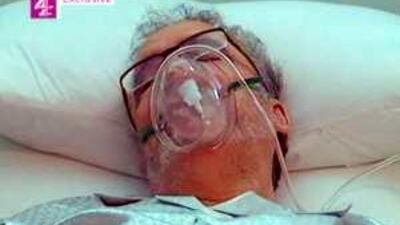TRIPOLI // The British prime minister, Gordon Brown, beat back mounting accusations yesterday that London had pressured Scottish authorities into releasing the Lockerbie bombing convict, Abdel Basset al Megrahi, for trade deals. Meanwhile, the object of contention lay apparently racing towards death in a hospital bed in his native city of Tripoli, the Libyan capital.
Two weeks after his controversial release from prison on compassionate grounds, al Megrahi, dying of prostate cancer, has vanished into a hospital in Tripoli, where Libyan officials told Reuters yesterday that he had been moved to the emergency room. Considered a diplomatic coup for Muammar Qadafi, the Libyan leader, al Megrahi's release is also a substantial victory at home, where his extended family is influential and he is widely considered an innocent man, analysts said.
"Megrahi is a respected senior member of a competing tribe which Qadafi has worked hard to incorporate into his power system," said Ronald Bruce St John, a Libya expert with Foreign Policy in Focus, a think tank that is part of the Washington-based Institute for Policy Studies. "It's a big win for Qadafi domestically." State security agents at al Megrahi's gleaming villa in Tripoli's Hay Dimashq neighbourhood said on Tuesday that the family were spending most of their time at his hospital bedside.
The Megrahis quietly settled in Hay Dimashq two years ago, said a neighbour, Yousef Dardour, 26, whiling away Tuesday evening beneath a street lamp with his brother, Imad, 24. "Of course, when we learnt it was them, we were excited." The residents of al Megrahi's street live demurely in their comfortable villas, Yousef Dardour said. "The Megrahis are a nice family and have kids my age. It's good that their father is back in Libya."
Al Megrahi's journey in and out of prison began 10 years ago when Libya sought to repair relations with the West after three decades as an international pariah. That period began when Mr Qadafi seized power in 1969 in a bloodless coup that toppled Libya's pro-western monarchy. Banning political parties, he set up a system of town-hall committees that critics say masks his own iron rule as "Brother Leader and Guide of the Revolution".
Mr Qadafi went on to support numerous militant groups. In 1988, 270 people were killed when Pan Am Flight 103 was brought down by a bomb over the Scottish town of Lockerbie, an attack blamed on Libyan agents that led to international sanctions being piled on the country. In 1999 Libya began rapprochement with the West by delivering al Megrahi, a former intelligence agent, and a suspect in the Lockerbie bombing for trial by a Scottish court convened in the Netherlands. The other man was acquitted, but al Megrahi was sentenced to life in prison with a minimum of 27 years.
However, Mr Qadafi has always maintained al Megrahi's innocence and vowed to bring him home. Two weeks ago Scottish authorities released him after doctors gave him just three months to live. British leaders have scrambled to deny accusations that al Megrahi was traded for Libyan oil deals. However, they and others have condemned what they consider the hero's welcome al Megrahi received on the tarmac in Tripoli.
Libyan officials have said al Megrahi's arrival was low-key by Libyan standards, arguing that no government officials were present and only a few hundred extended family members turned up to greet him. While the West fumes, Mr Qadafi is basking in the latest success in a year that includes his presidency of the African Union and a trip this month to the United Nations. Al Megrahi's return is "an important personal victory in terms of local politics", for Mr Qadafi, said Mustafa Fetouri, a political analyst and professor of business management at Tripoli's Academy of Graduate Studies. "The whole social fabric is built on clans."
While Libyans are rejoicing at their country's economic opening since international sanctions have lifted over the past decade, the government has not made full use of the country's vast oil wealth to create jobs and rebuild infrastructure, said John Hamilton, a contributing editor at Africa Energy magazine. Meanwhile, a report published on Monday by the New York-based Human Rights Watch said that despite some recent reforms, Libyan authorities still restrict free speech and imprison critics.
Mr Qadafi has proposed shrinking government and Saif al Islam, his son, has explored options for a new constitution. Although modest reform may happen, Mr Qadafi will remain firmly in charge, Prof Fetouri said. In the evening hush on Tuesday in Hay Dimashq, Yousef and Imad Dardour dreamt of a post-Lockerbie future for Libya. "We need more manufacturing," said Imad, who plans a career in the oil industry. "That car is from America; this shirt from China: why? These things could be made in Libya."
@Email:jthorne@thenational.ae

